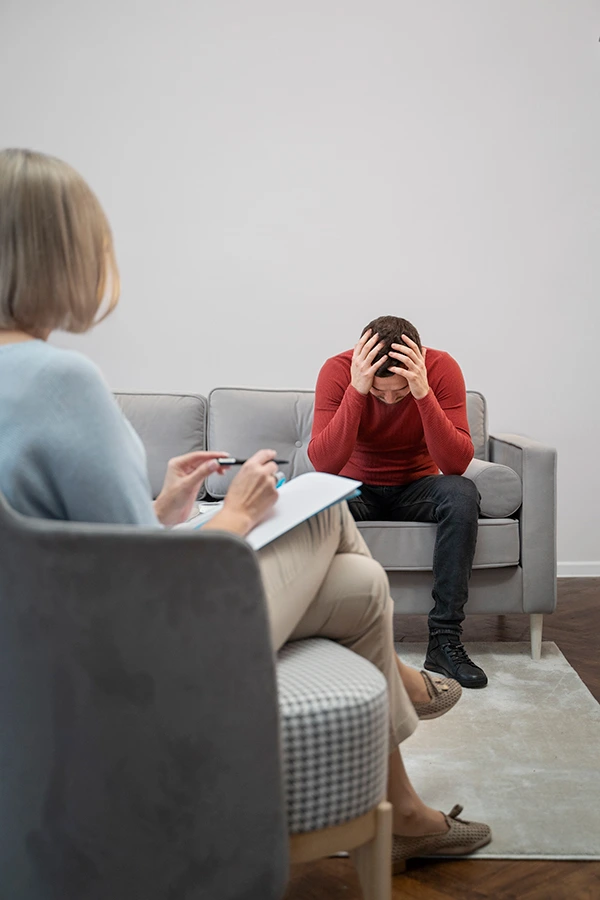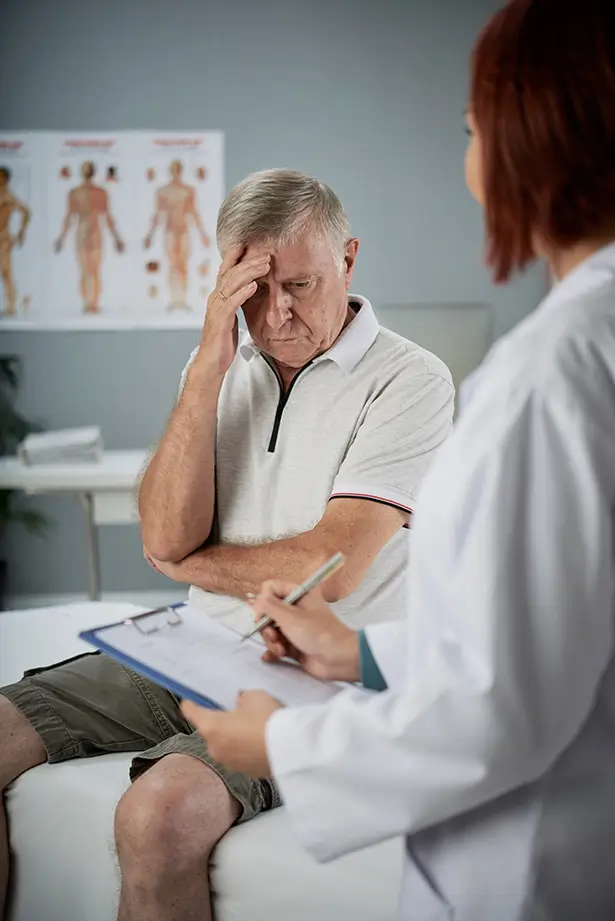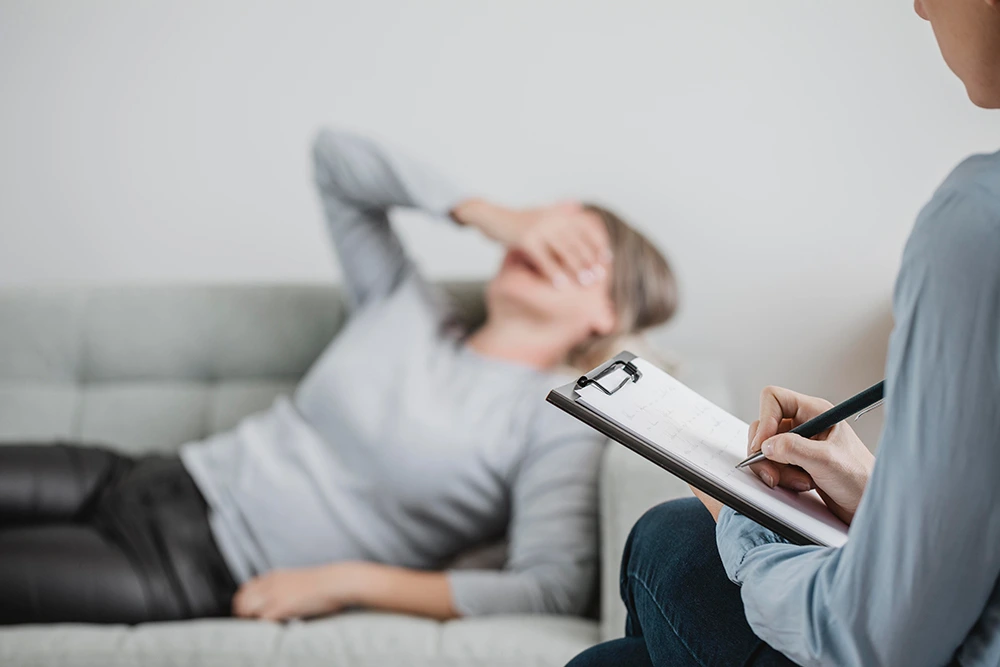Overcome anxiety with our trusted treatment center
Don’t let anxiety define you. Discover peace of mind and a supportive environment at New Jersey’s top anxiety treatment center.
Request a Callback
Outpatient Anxiety Treatment: Insights
As humans, we deal with a ton of emotions every day and it’s normal to feel anxious sometimes. You might feel uneasy before addressing a work challenge, attending an interview, taking a test, or making an important decision. However, when anxiety becomes more frequent and starts to impact your health and daily life, it’s a sign to give yourself extra care. In fact, 43% of adults in 2024 reported feeling anxiety more often than in the previous year.
While anxiety is tied to the body’s stress response and can be helpful in certain situations, like staying alert or motivated, it can become a problem when it’s persistent. If anxiety is affecting your well-being, an anxiety treatment center could provide the support you need to feel better and regain control.
The good news is that anxiety is treatable. At Relevance Recovery, we offer outpatient anxiety treatment, which is ideal for those who have busy daily schedules and can’t commit to inpatient rehab. Outpatient treatment allows you to receive the care you need while continuing with your work, studies, or personal life. Start your journey to better mental health with our flexible and supportive approach.


What is Anxiety & How it Develops
Anxiety can manifest as a feeling of unease, restlessness, or constant worry. It might arise in unexpected moments, like meeting new people, stepping into unfamiliar environments, or even tackling everyday responsibilities. While occasional anxiety is a normal part of life, when it starts to feel overwhelming or disrupts your routine, it may point to an anxiety disorder.
Over time, anxiety can grow stronger and more overwhelming. For some, it starts to interfere with daily life, making it hard to focus on tasks or feel comfortable in certain situations. You may begin to experience physical symptoms like a racing heart or sweating. These reactions often become out of proportion to the problem, and it may feel impossible to control your feelings.
If anxiety starts to affect your day-to-day life, it’s important to seek help. An anxiety treatment center can offer effective solutions to help manage the condition.
Symptoms of Anxiety
Anxiety is a normal feeling, but it can sometimes cause physical signs like shaking or sweating. When anxiety stays around for a long time or gets too strong, it may turn into an anxiety disorder.
Psychological symptoms may include:
- Feelings of panic, fear, or uneasiness
- Feeling on edge or irritable
- Uncontrollable, obsessive thoughts
- Difficulty concentrating
Physical symptoms may include:
- Restlessness
- Heart palpitations
- Shortness of breath
- Muscle tension
- Cold or sweaty hands
- Dry mouth
- Nausea
- Numbness or tingling in the hands or feet
- Trouble falling or staying asleep (insomnia)
Recognizing both the psychological and physical signs of anxiety is crucial. If you experience these symptoms frequently, it’s important to consult a healthcare provider or mental health professional for support.

Why Choose an Outpatient Treatment Center for Anxiety
Outpatient anxiety treatment allows you to receive effective care while maintaining your daily routine. It provides a flexible, supportive environment where you can focus on overcoming anxiety without the need for inpatient hospitalization.
Here are the reasons why outpatient treatment could be the right choice for you:
- Maintain Your Regular Life: Continue with work, studies, and daily activities while receiving treatment.
- Safe and Supportive Environment: Get care in a setting designed to help you manage anxiety effectively.
- Access to Expert Care: Benefit from specialized mental health professionals experienced in treating anxiety disorders.
- Personalized Treatment Plan: Develop a customized roadmap to overcome anxiety with tailored coping strategies.
- Flexibility in Treatment: Enjoy flexible scheduling that fits your lifestyle and supports your recovery journey.
With expert care, flexibility, and a personalized approach, it offers a path to recovery that works around your unique needs. Take the first step towards overcoming anxiety today.


Holistic Approach For Anxiety Treatment
Outpatient anxiety treatment offers more than traditional therapy, adopting a holistic approach to address anxiety from multiple angles. Key modalities include:
- Cognitive Behavioral Therapy (CBT): Recognized as the gold standard for anxiety, CBT helps identify and reframe unhelpful thoughts, empowering you with healthier coping strategies to manage emotions and behavior.
- Exposure Therapy: By gradually confronting fears in a safe setting, this therapy helps reduce anxiety responses and desensitize triggers over time.
- Relaxation Techniques: Mindfulness, deep breathing, and yoga provide practical tools to manage stress and anxiety effectively.
- Medication Management: For severe cases, medication may complement therapy. Psychiatrists evaluate individual needs and prescribe medication if necessary.
- Support Groups: Connecting with others facing similar struggles fosters understanding, reduces isolation, and provides mutual support.
This comprehensive approach ensures personalized care to help you overcome anxiety and regain balance.
We Work With Most Major Insurance Providers
- Aetna
- Amerihealth
- Anthem
- Beacon
- Behavioral Health Systems
- BCBS—Most BlueCross & BlueShield Plans
- Carelon Behavioral Health
- CareFirst
- Cigna
- ComPsych
- Coventry
- Empire BlueCross BlueShield
- GHI
- Highmark
- Humana
- Magellan
- MagnaCare
- Meritain Health
- MultPlan
- NYSHIP (New York State Insurance Plan)
- Optum
- Oxford
- PHCS
- Self-Pay
- TRICARE
- UHC
- UMR
- VA Insurance
- 90 Degree Benefits
- Aetna
- Amerihealth
- Anthem
- Beacon
- Behavioral Health Systems
- BCBS—Most BlueCross & BlueShield Plans
- Carelon Behavioral Health
- CareFirst
- Cigna
- ComPsych
- Coventry
- Empire BlueCross BlueShield
- GHI
- Highmark
- Humana
- Magellan
- MagnaCare
- Meritain Health
- MultPlan
- NYSHIP (New York State Insurance Plan)
- Optum
- Oxford
- PHCS
- Self-Pay
- TRICARE
- UHC
- UMR
- VA Insurance
- 90 Degree Benefits
At this time, we do not accept Medicaid or Medicare.
Relevance saved my life. Everyone here is so helpful and genuine. I highly highly recommend!
This program was absolutely life changing. It fully brought me out of a dark tunnel and into a fresh perspective of enlightenment.
Coming from another treatment center from southern Jersey, I was really anxious and afraid, being completely out of my element, it felt like I was a fish out of water. Relevance’s team really made me feel comfortable while I was being treated, and I thank them for that. I felt really supported and cared for during the time I attended program!
Grateful for Relevance and their open door to seek the treatment I needed.
Great place! All the people are friendly and the staff helped me greatly in my recovery.
This place is a wonderful place to better yourself if you’re looking for a place that still feels like reality. You are not isolated from the rest of the world, but working on yourself within it. Most of the employees here really make an effort to help you, and the atmosphere is wonderful! I’m so greatful for this place
Relevance was such a welcoming environment every day. Staff was amazing supportive and caring. Definitely helped me prepare for life after treatment.
When to Get Help for Anxiety
You should seek professional help for anxiety if it’s affecting your daily life or causing you distress:
- Interfering with Daily Life: If your anxiety is causing problems at school, work, or with friends and family.
- Persistent Worry: If your fear or worry won’t go away, even when there’s no real reason to feel anxious.
- Suicidal Thoughts: If you have thoughts of harming yourself or others, seek emergency treatment immediately.
- Other Mental Health Concerns: If you’re feeling depressed, struggling with alcohol or drug use, or dealing with other mental health issues along with anxiety.
When life feels hard and you’re feeling low, it’s important to remember that you don’t have to face anxiety alone. It’s time to contact an anxiety treatment center and seek the help you deserve. Support at Relevance Recovery is available to help you take control and feel better.

Relevance Recovery’s Outpatient Anxiety Treatment
Anxiety can affect every part of your life, leading to stress, job loss, and even addiction. At Relevance Recovery, we offer a unique approach that helps you manage anxiety and addiction with a holistic, multidisciplinary method.
Our outpatient anxiety treatment and customized plans focus on balancing a healthy diet, exercise, and counseling, along with therapies like music therapy, yoga, and biofeedback. We work closely with you to create a treatment strategy that’s tailored to your individual needs.
Since opening, we’ve helped over 200 families regain control of their lives. Don’t let anxiety hold you back—reach out to Relevance Recovery and take the first step toward a fulfilling, worry-free life.
FAQs: Outpatient Anxiety Treatment
Yes, outpatient treatment can help manage long-term anxiety, especially with consistent therapy and support.



